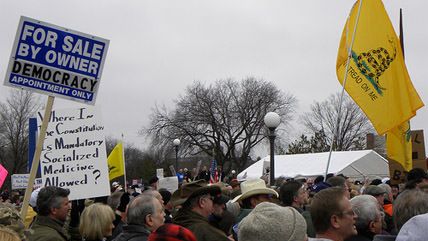Whatever Its Faults, the Tea Party Identified the Right Target
A look back on its development over the last five years.

It's been five years since Rick Santelli's CNBC "rant that shook the world" helped give rise to the Tea Party movement.
The first wave of anti-big-government protests began in the cities, and they were "about as libertarian as it gets," as political number-cruncher Nate Silver put it at the time: light on moralism, heavy on "fiscal responsibility, limited government, and free markets," per the "Tea Party Patriots" founding credo.
At the massive Sept. 12, 2009, Tea Party rally in Washington, Ron Paul's kids mixed with graying Gen X'ers and Baby Boomers; I snapped pictures of "What Would Mises Do?" signs and an erudite codger with a placard blaring: "Austrian Business Cycle Theory!" Could it be—some of us dared hope—that we were witnessing the birth of that unlikeliest of creatures: a libertarian mass-movement?
Half a decade later, that looks like a classic case of "irrational exuberance." No doubt there's a lot to be said for a movement that drives genial establishmentarians like Sen. Orrin Hatch, R-Utah, to paroxysms of rage: "These people are not conservatives!" Hatch howled on NPR in 2012, "they're radical libertarians and I'm doggone offended by it. I despise these people!" (Doggone!)
Still, I can relate to the fellow at Thursday's Capitol Hill Tea Party Patriots anniversary event, a former Ron Paul volunteer who volunteered to the Washington Post that he was "so frustrated talking to these neocons," he needed a pre-noon shot of Jameson.
Early on, Beltway hawks were terrified that the movement would exercise "the scariest kind of influence" on American foreign policy, shrinking defense budgets and ending America's globocop role. Yet "Tea Party Republicans hold about the same views as non-Tea Party Republicans about America's role in solving world problems," according to the Pew Research Center. And when polls show that "tea party supporters, by a nearly 2-to-1 margin, declared significant cuts to Social Security 'unacceptable,'" we're not talking about a particularly "radical" form of libertarianism.
More frustrating still, as Conor Friedersdorf has pointed out, too often, Tea Partiers have been suckers for "some of the most obviously irresponsible charlatans in American life." If you're a GOP pol who lacks the chops to become president of the U.S., Michael Brendan Dougherty observes, you may have "enough talent to become President of Conservatism." The responsibilities are minimal and the speaking fees are sweet.
Alas, these are the sorts of talents Tea Partiers swooned for in the 2012 primaries: Herman Cain, Donald Trump, Newt Gingrich—even Rick Santorum, a self-proclaimed enemy of libertarianism who was the opposite of everything the Tea Party was supposed to stand for.
Herman Cain, who's gone from the "9-9-9 plan" to promoting erectile dysfunction supplements, didn't have what it takes to become "President of Conservatism." But that title may go to new Tea Party fave Sen. Ted Cruz, R-Texas. Cruz has some Iowa trips planned, but his debate-camp-honed charisma had the Weekly Standard's Andy Ferguson wondering, during a car ride with Cruz, how many vertebrae he'd crack if he jumped out of the car and did "a tuck-and-roll onto the passing pavement."
The Tea Partiers' poor choice of banner carriers helps explain why their brand has suffered, and libertarian identification with the movement has waned over time. According to a recent poll by the Public Religion Research Institute, "a majority of libertarians (61 percent) say they do not consider themselves a part of the Tea Party movement."
Still whatever errors they've made along the way, the Tea Partiers identified the right target: our profligate political class. That class will continue to reign, unless and until they're confronted with a citizen movement that marries passion with sound judgment.
This column originally appeared in the Washington Examiner.


Show Comments (154)